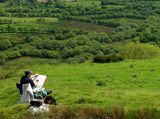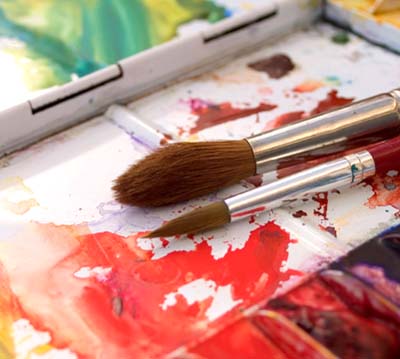Watercolours: getting started
How to get started painting watercolours including tips and advice from the experts, courses and the best kit to buy


Exquisite houses, the beauty of Nature, and how to get the most from your life, straight to your inbox.
You are now subscribed
Your newsletter sign-up was successful
When Emma painted Harriet Smith in Jane Austen's eponymous novel, attracting the unwanted attentions of Mr Elton, she was performing one of the principal accomplishments of young 19th-century ladies. Yet watercolour has a far more distinguished presence in art history than its place in polite morning rooms might suggest. Paul Sandby's sketches of Windsor Castle, Thomas Girtin's Picturesque Lake District landscapes and J. M. W. Turner's swirls of colour are all notable elements of a canon that has its foundations in the Middle Ages and reached its apotheosis in the 18th century, when Sandby was dubbed the Father of the English watercolour.
The preferred method of topographical artists for painting landscapes and buildings, watercolour is unparalleled for capturing crumbling Classical architecture or bustling townscapes, often augmented with pen and ink. Today, the popularity of this peculiarly English medium inspired the tele- vision programme Watercolour Challenge, and it even has the royal seal of approval-The Prince of Wales recently published his efforts online at www.princeofwales.gov.uk OP
Getting started
Although the basics of watercolour painting are simple, a little tuition never goes amiss. The Chelsea School of Art in London runs four-day courses that allow beginners to learn the essentials and expand their skills, costing £415 and running on July 21-24 and August 26-29 (020-7514 6311; www.arts.ac.uk), and you can emulate the master on a summer course at the Ruskin School of Drawing and Fine Art in Oxford (01865 276940; www.ruskin-sch.ox.ac.uk).
East Anglia's muted shades have long attracted watercolourists and there are several courses based there. In Norfolk, Jan Blanch runs one- and three-day workshops at Leath Farm, West Somerton, near Great Yarmouth (www.janblanch.co.uk; 01493 393639) and, in Suffolk, Flatford Mill offers Watercolour for Absolute Beginners, which runs from May 9 to 11 and costs £170 for non-residents or £238 including accommodation (01206 297110; www.field-studies-council.org).
The South-West is an artists' haven. Marlborough College Summer School in Wiltshire offers a beginners' course with Jonathan Newey, running from July 28 to August 1 (01672 892388; www.mcsummerschool.org.uk), which focuses on landscapes and moves on to buildings. In Cornwall, the Newlyn School of Art (above) offers two-day courses on February 15-16 and May 17-18, priced at £130 (01736 365557; www.newlynartschool.co.uk).
In London, the Sir John Soane's Museum offers an inspirational setting for an evening course, on which you can be inspired by the great man's own collection of watercolour paintings (020- 7405 2107; www.soane.org).
Exquisite houses, the beauty of Nature, and how to get the most from your life, straight to your inbox.
Give it a try
Visit a gallery, then take a sketchpad, paintbox and jam jar of water to a favourite spot and see if you can capture a valley or meadow. Try using a frame to focus on a particular view, as lovers of the Picturesque did when they attempted to capture the rugged hills of the Lake District in the 18th and 19th centuries. If you want a more structured approach, try a one-day course such as those offered by Catherine Stott on the Devon-Somerset border (01398 332094; www.inspiredbygardens.co.uk).

What to buy
Winsor & Newton lightweight field box, £44.10, Jackson's and Co (www.jacksonsart.com; 020-7254 0077)
Kolinsky sable brushes, set of three, £50, Rosemary and Co (01535 600090; www.rosemaryandco.com)
Winsor & Newton artists' watercolour A4 gummed pad, £9.75, Cass Art London (020-7619 2601; www.cassart.co.uk)
Old Holland watercolour introductory set, £22, Jackson's and Co (www.jacksonsart.com; 020-7254 0077)
Daler Rowney table box easel, £44.95, Lawrence (01273 260260; www.lawrence.co.uk)
Make a weekend of it
Illustrating St Ives, St Ives School of Painting, Cornwall Artist and illustrator Gary Long teaches inside and out, depending on the weather, concentrating on landscapes and seascapes. The course is centred on waterbased paints, but you can try your hand at other media. The school can recommend hotels and B&Bs. The course costs £235, including all materials, and runs from August 4 to 6. (01736 797180; www.schoolofpainting.co.uk) Botanical Watercolour Course, Mount Slaney, Co Wicklow, Ireland Botanist and artist Holly Somerville imparts her knowledge from her studio in the West Wicklow hills. All levels of skill can be accommodated, and numbers are restricted to eight per course. There is limited accommodation in the Granary on-site at €45 (£38) per night, and Holly can recommend other local B&Bs. €125 (£105) for a two-day course, including lunch and all materials. (00 353 87 6374720; www.hollysomerville.com)
Tips from the expert Norfolk-based watercolour artist Gerard Stamp (www.gerardstamp.com) gives some pointers * Get good-quality sable brushes and some large ones rather than little scratchy things * If possible, stretch your own paper instead of using a pad block, because the paper underneath inevitably starts getting damp and it becomes difficult to dry. If you're working in a studio, a hair dryer is useful * Mix more paint than you think you will need * Use fewer colours rather than more. Most beginners think they need a dozen or more, but four or five is quite enough. You can make all sorts of greys and blacks by mixing them together-work from light to dark * Be brave. Don't stab at a white sheet with little scrawny lines-use big washes
Read all about it
Handbook of Watercolour Tips & Techniques Arnold Lowrey, Wendy Jelbert, Geoff Kersey and Barry Herniman (Search Press, £9.99)
Understanding Watercolours Huon Mallalieu (Antique Collectors' Club, £29.95)
British Watercolours 1750-1950 Katherine Coombs (V&A Publishing, £25)
Don't miss
February 6-9 Works on Paper Fair, Science Museum, London SW7 (01798 861815; www.worksonpaperfair.com)
February 7-May 5 ‘Capturing the Castle' by Paul and Thomas Sandby, The Drawings Gallery, Windsor Castle, Berkshire (www.royalcollecton.org.uk; 020-7766 7304)
March 7-19 Royal Watercolour Society Exhibition, Bankside Gallery, London SE1 (020-7928 7521; www.royalwatercoloursociety.co.uk)
* Subscribe to Country Life and save
* Follow Country Life on Twitter
Country Life is unlike any other magazine: the only glossy weekly on the newsstand and the only magazine that has been guest-edited by His Majesty The King not once, but twice. It is a celebration of modern rural life and all its diverse joys and pleasures — that was first published in Queen Victoria's Diamond Jubilee year. Our eclectic mixture of witty and informative content — from the most up-to-date property news and commentary and a coveted glimpse inside some of the UK's best houses and gardens, to gardening, the arts and interior design, written by experts in their field — still cannot be found in print or online, anywhere else.
